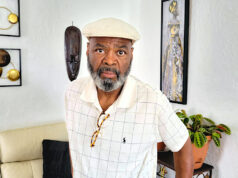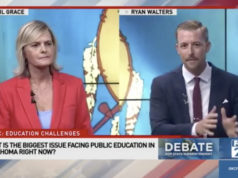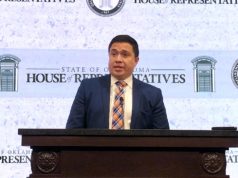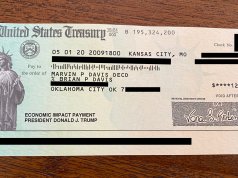
When the Gathering of the Juggalos drew thousands of people to northeast Oklahoma City in July, jokes abounded on local social media about Insane Clown Posse fans and the ruckus their painted faces and colored hair might cause.
It happened that my oldest friend was in town that weekend from New York, so I just couldn’t justify the personal time it would have taken for me to offer Total Coverage of the festival. But I had really wanted to dive into that world and find stories among one of America’s most ostracized groups of music fans.
In the end, most OKC media coverage of the Gathering of the Juggalos revolved around 9-1-1 calls and fear of strangers. KFOR Channel 4 focused on 11 people being transported to hospitals.
“Officials say those injuries mainly consisted of heat-related illnesses and drug overdoses,” the station reported, noting that one person had been trampled in a mosh pit.
KOKH Fox 25 reported that eight people were arrested during the Juggalo festival: two for possessing fireworks, a few for possessing drugs, one for slapping a former co-worker and one for driving under a suspended license.
But I worried none of that was putting the Juggalo gathering into enough perspective. After all, a Kenny Chesney concert in 2016 saw 37 people arrested by Pittsburgh police, which was down 50 percent from Chesney’s 2013 Pittsburgh concert that featured 73 arrests.
While KGOU’s Claire Donnelly did a good story interviewing some Juggalos before the festival, I had to turn to the Washington Post for the deep examination of Juggalo culture I had wanted to do myself:
“Trolleys,” tractors pulling hitches like a hayride but littered with trash, circulated around the camp, delivering people to three stages. They featured bands, burlesques, a beauty pageant, wrestling and more. Other Juggalos tore around in golf carts, some cradling beers or joints, as they gripped the wheel. In the next few days, I would witness some remarkably bizarre moments. I’d find an 8-year-old kid punching people in the face for money. On another occasion, as I was interviewing a Juggalette, a drunken woman clutching a long-necked pink glass plowed her cart into the Juggalette’s tent. A passenger hopped off and offered to make up for it: “Cash or drugs?”
The Post’s Devin Doyle landed on what I had assumed I would find at the OKC festival:
I met Juggalos who were IT specialists and nurses, but most were blue collar and from Rust Belt cities or small towns. Many said they were or had been homeless or had survived broken homes, sexual abuse, extreme poverty and other difficulties. Some are gay. They said the gathering was a place of radical acceptance, welcoming all comers. “If you can’t find any other place to fit in because society tells you you can’t fit in with this or that group, you’ve got to find your own group,” (Scott) Creel said. “I kind of think that’s where Juggalos came from. We are outside of the outsiders.”
‘Pure fucking madness’
Not quite two months later, Juggalos are again in the news as they march on Washington today at 2 p.m. eastern time. What will that look like? Frankly, I can’t wait to check CNN and see whether it’s being covered.
Because, as Insane Clown Posse member Shaggy 2 Dope notes in the promotional video above:
The injustice we’re facing just to protest the injustice we’re facing is pure fucking madness. It was only after 2011 when they put out the gang assessment list, but all that don’t matter ’cause ever since then still it’s been fucking up our business, fucking up Juggalos’ lives and fucking up anybody who wants to represent any kind of Juggalo culture in public.
If that’s not a profanity-laden plea for equal treatment from a misunderstood American subculture, I don’t know what is.
Here’s more info on the FBI’s infamous comments on ICP fans, and here’s hoping some intrepid D.C. journalists will help us gain perspective at today’s Juggalo March. Until then, enjoy the “Jugga-lawyer” in the video above.




















